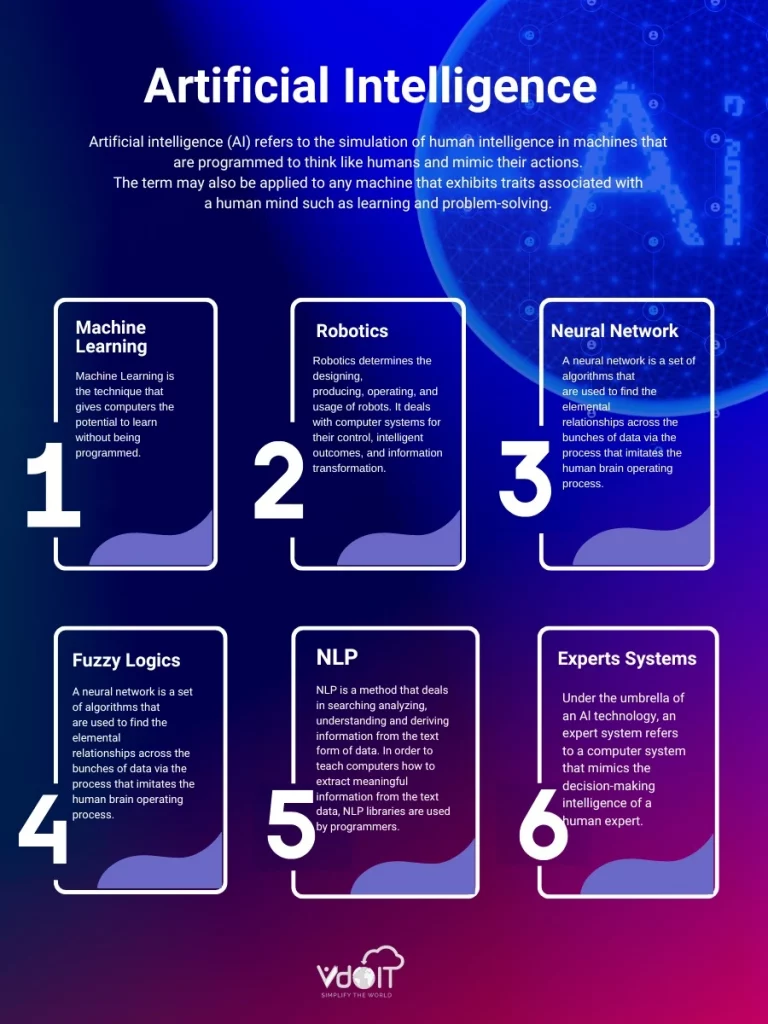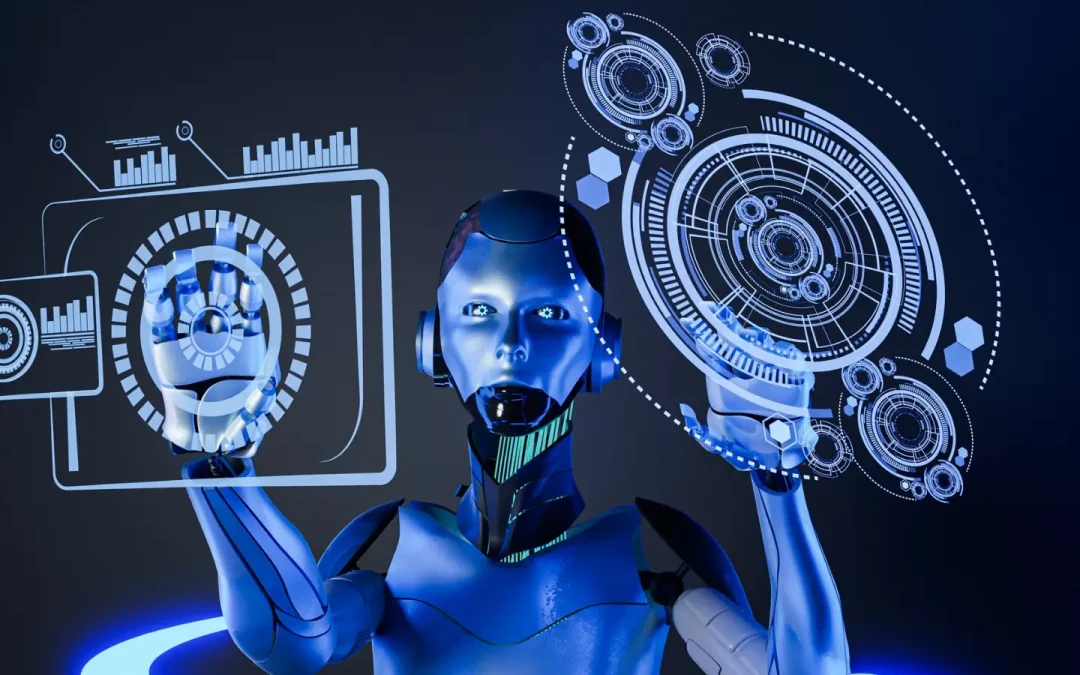Artificial Intelligence (AI) is a transformative force in science and technology, revolutionizing how we approach research, problem-solving, and innovation. From predictive analytics to autonomous systems, AI has permeated various disciplines, catalyzing advancements and pushing the boundaries of what’s possible. This article delves into the multifaceted role of AI across different domains of science and technology, exploring its impact, challenges, and prospects.
AI in science and technology is not just a passing trend. It is set to make rapid changes, ensuring that solutions are not only innovative but also accessible to all. This promises a future where the benefits of AI are not limited to a few but shared by many.
Importance And Benefits Of Artificial Intelligence
It is impossible to list all the important benefits of artificial intelligence in science and technology. Let’s look at the major ones.
1. AI in Research and Discovery
AI has expedited and revolutionized the pace of scientific discovery. By augmenting researchers’ capabilities in data analysis, pattern recognition, and hypothesis generation, it has opened up new frontiers in fields like genomics. AI-driven algorithms now sift through vast datasets at lightning speed to identify genetic markers associated with diseases, accelerating the development of personalized medicine in once unimaginable ways.
Similarly, in materials science, AI models predict the properties of novel materials, streamlining the process of material discovery for applications ranging from electronics to renewable energy. Drug discovery is another area where AI shines, with algorithms capable of analyzing molecular structures, simulating interactions, and identifying potential drug candidates, significantly reducing the time and costs associated with traditional methods.
Work With VDOIT – The Top Artificial Intelligence Services & AI Development Company
2. AI and Robotics
Robotics, one of the most visible applications of AI, is a field constantly evolving and pushing the boundaries of what’s possible. Intelligent systems enable robots to perceive, learn, and adapt to their environments, promising a future where human-like machines are both a possibility and a reality. In manufacturing, AI-powered robots optimize production processes through tasks like quality control, assembly, and logistics, enhancing efficiency and flexibility.
Autonomous vehicles, propelled by AI algorithms for navigation and decision-making, promise to revolutionize transportation, offering safer and more efficient alternatives to traditional modes. Robotic exploration, both terrestrial and extraterrestrial, benefits from AI-driven systems capable of autonomously navigating challenging terrains, conducting scientific experiments, and even repairing equipment in hostile environments.
3. AI in Healthcare
The healthcare sector stands to gain immensely from AI-driven innovations, with applications ranging from diagnostics and treatment optimization to patient care and administrative tasks. Medical imaging, such as MRI and CT scans, benefits from AI algorithms that enhance image quality, assist in early disease detection, and facilitate precise treatment planning.
AI-powered virtual assistants and chatbots are increasingly utilized to provide personalized medical advice, schedule appointments, and monitor patients’ health remotely, improving access to healthcare services. Predictive analytics fueled by AI help healthcare providers identify patients at risk of developing certain conditions, enabling proactive interventions and resource allocation.
4. AI and Environmental Sustainability
Addressing environmental challenges requires innovative solutions, and AI offers many tools to monitor, analyze, and mitigate environmental impacts. Remote sensing technologies and AI algorithms enable real-time monitoring of ecosystems, deforestation, and climate change indicators, facilitating informed decision-making.
Smart energy systems leverage AI to optimize energy consumption, predict demand patterns, and integrate renewable sources into the grid, contributing to a more sustainable energy future. AI-driven models aid in natural disaster prediction and management, providing early warnings and guiding emergency response efforts to minimize human and environmental losses.
5. Challenges and Ethical Considerations
Despite its immense potential, AI poses challenges and ethical dilemmas that must be addressed to ensure responsible and equitable deployment. Bias and fairness issues arise when AI algorithms reflect and perpetuate societal biases in the training data, leading to disparities in outcomes, particularly in areas like criminal justice and hiring.
Privacy concerns emerge with the proliferation of AI-powered surveillance systems and data collection practices, raising questions about individual rights and data security. The rapid advancement of AI also fuels apprehensions about job displacement and socioeconomic inequalities, necessitating proactive measures to reskill workers and mitigate the impact on vulnerable populations.
6. Future Directions
Looking ahead, the future of AI in science and technology promises even greater innovation and impact across diverse domains. Advancements in AI research, including developments in deep learning, reinforcement learning, and explainable AI, will further enhance the capabilities and trustworthiness of intelligent systems.
Interdisciplinary collaborations between AI researchers, domain experts, and policymakers will be crucial in addressing complex challenges and harnessing AI for societal benefit. Embracing transparency, accountability, and inclusivity principles will be essential in shaping an AI-powered future that upholds ethical standards and promotes human well-being.
Why AI is Needed in Science & Technology

Artificial Intelligence has emerged as a transformative force in science and technology, reshaping industries, accelerating innovation, and addressing pressing societal challenges. From revolutionizing healthcare and environmental sustainability to unlocking new frontiers in research and discovery, AI’s potential is boundless.
However, realizing this potential requires navigating ethical considerations, addressing challenges, and fostering collaboration across disciplines. By harnessing the power of AI responsibly and inclusively, we can pave the way for a future where technology serves humanity’s collective interests and aspirations.
How Can We AI Enabled Tableau for In Science and Technology
In science and technology, the integration of Artificial Intelligence has revolutionized data analysis and decision-making processes. One of the key challenges in this AI-driven landscape is the effective visualization and interpretation of vast amounts of data. This is where Tableau comes into play. However, you need top tableau consulting services to help you combine both!
1. Data Visualization and Analysis
Tableau provides powerful data visualization capabilities that allow scientists and technologists to create interactive and intuitive visual representations of AI data. Whether it’s for exploring trends, identifying patterns, or uncovering insights, Tableau’s drag-and-drop interface makes it easy to transform raw AI data into meaningful visual stories.
2. Enhancing Predictive Analytics
AI in science and technology often involves predictive analytics to forecast future trends and behaviors. Tableau seamlessly integrates with AI models and algorithms, enabling users to visualize predictive outcomes. By combining AI’s predictive power with Tableau’s visualizations, researchers and analysts can better understand and communicate predictions, leading to more informed decisions.
3. Real-time Data Processing
In fields such as genomics, environmental science, and aerospace, real-time data processing is crucial. Tableau’s ability to handle real-time data feeds allows scientists to monitor AI-driven experiments and simulations in real-time. This real-time visualization ensures that any anomalies or significant findings can be promptly addressed.
4. Collaborative Research
Tableau’s collaborative features facilitate teamwork among researchers and technologists. Through shared dashboards and interactive reports, teams can collectively explore AI data, share insights, and collaborate on projects. This fosters a collaborative environment that accelerates scientific discovery and technological innovation.
5. Integration with AI Tools
Tableau integrates with a wide range of AI and machine learning tools, such as Python, R, and TensorFlow. This interoperability allows scientists and technologists to embed sophisticated AI models within Tableau dashboards, providing a seamless workflow from data ingestion to visualization.
The Importance of Artificial Intelligence in Today’s World
Artificial Intelligence (AI) has become indispensable today, permeating various aspects of our lives and driving transformative change across industries. Its importance lies in its ability to analyze vast amounts of data, automate tasks, and make predictions with unprecedented accuracy.
AI helps in disease diagnosis and treatment planning in healthcare, improving patient outcomes. In finance, it optimizes trading strategies and risk management, enhancing efficiency and profitability. Moreover, AI-driven personal assistants streamline daily tasks, while autonomous vehicles promise safer and more efficient transportation.
The significance of AI also extends to addressing societal challenges, such as climate change and poverty, by enabling data-driven insights and innovative solutions. As we continue to harness the power of AI, it is crucial to ensure ethical use and mitigate potential risks, ensuring that AI benefits humanity while respecting privacy, fairness, and accountability. AI’s importance lies in its capacity to revolutionize industries, empower individuals, and shape a more efficient, equitable, and sustainable future.
Also read: Unity 3D
FAQ : Artificial Intelligence in Science and Technology
How is AI being used in scientific research?
AI is revolutionizing scientific research by automating data analysis, identifying patterns, and making predictions. Machine learning algorithms can process vast datasets faster and more accurately than traditional methods. AI aids in drug discovery, genomics, climate modeling, and particle physics, among other fields.
What are the benefits of AI in technology development?
AI enhances technology development by improving efficiency, accuracy, and innovation. It enables the creation of intelligent systems that can learn from data and adapt over time.
In fields like cybersecurity, AI detects and responds to threats in real time. In manufacturing, AI-driven automation increases production speed and quality.
AI also fosters innovation by enabling the development of new technologies such as autonomous vehicles, smart home devices, and advanced robotics.
How does AI contribute to medical advancements?
AI significantly contributes to medical advancements by improving diagnostics, personalized medicine, and patient care. AI algorithms analyze medical images, detect anomalies, and assist in early diagnosis of diseases like cancer.
In personalized medicine, AI processes genetic information to recommend tailored treatments. AI-driven predictive analytics help in managing chronic conditions and predicting patient outcomes.
Additionally, AI-powered robots assist in surgeries, improving precision and reducing recovery times. These applications enhance the accuracy, efficiency, and effectiveness of healthcare, ultimately leading to better patient outcomes.
What role does AI play in environmental science?
AI plays a crucial role in environmental science by enhancing climate modeling, biodiversity monitoring, and resource management. AI algorithms analyze satellite imagery and sensor data to monitor deforestation, track wildlife, and predict natural disasters.
In climate science, AI improves the accuracy of weather forecasts and climate change models by processing complex datasets. AI also aids in optimizing the use of natural resources, such as water and energy, by predicting consumption patterns and identifying areas for conservation.
How is AI transforming the field of education?
AI is transforming education by personalizing learning experiences, automating administrative tasks, and providing intelligent tutoring systems. AI-powered platforms adapt to individual learning styles and paces, offering customized content and feedback.
This personalization helps improve student engagement and outcomes. AI also automates grading, attendance tracking, and other administrative tasks, allowing educators to focus more on teaching and mentorship. Intelligent tutoring systems provide real-time assistance and explanations, making learning more accessible.
What are the ethical considerations of using AI in science and technology?
The ethical considerations of using AI in science and technology include issues of bias, transparency, privacy, and accountability. AI systems can inadvertently perpetuate biases present in their training data, leading to unfair or discriminatory outcomes.
Ensuring transparency in AI decision-making processes is crucial for building trust and understanding. Protecting privacy is another significant concern, as AI often relies on vast amounts of personal data.
Additionally, determining accountability for AI-driven decisions and actions poses challenges.
Addressing these ethical considerations involves developing robust guidelines, policies, and oversight mechanisms to ensure the responsible and equitable use of AI.

